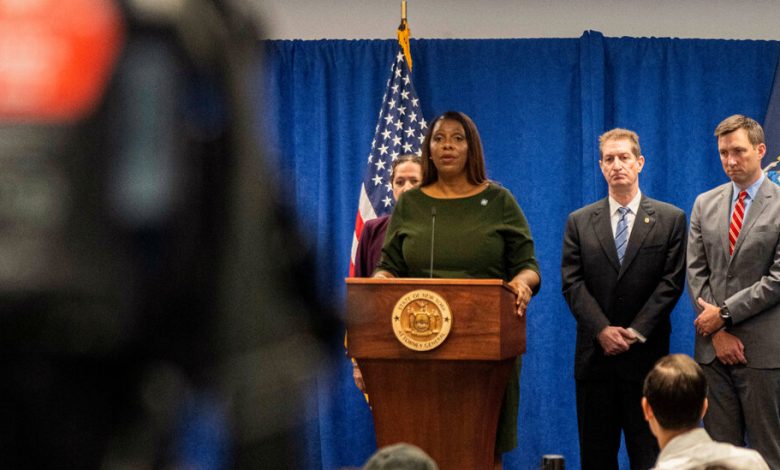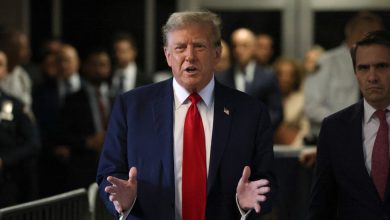Trump Is Battling a New York Law Used to Take on Corporate Giants

For decades, the New York attorney general’s office has relied on a little known but powerful law to take on what it sees as the most egregious corporate malefactors, including oil producers, big banks, tobacco companies and Martin Shkreli. Now this dubious club has a new member: Donald J. Trump.
The attorney general, Letitia James, sued the former president, his family business and three of his children on Wednesday, accusing them of lying to lenders and insurers by fraudulently and extravagantly overvaluing his assets — to the tune of billions of dollars.
Like thousands of earlier actions by the attorney general’s office — including those against the oil giant Exxon Mobil, the global bank UBS, the tobacco company Juul, and Mr. Shkreli and his former pharmaceutical company — Ms. James’s lawsuit against the Trumps hinges on a muscular law that provides her office with an upper hand when investigating and punishing corporate wrongdoing.
The law, enacted nearly 70 years ago when Jacob K. Javits was New York’s attorney general, has become a mainstay of the office. It has been central to a wide range of recent civil actions that have reaped hundreds of millions of dollars in settlements.
Ms. James’s lawsuit is not Mr. Trump’s first run-in with this particular statute; her predecessors employed it in legal actions against his for-profit education venture, Trump University, and his family charity, the Trump Foundation, both of which paid millions of dollars to resolve the cases. (The foundation was also dissolved).
Mr. Trump has denied all wrongdoing in the latest case and accused Ms. James, a Democrat running for re-election, of carrying out a politically motivated “witch hunt.”
The statute, known as Executive Law 63 (12), sounds more like an arcane ordinance than a powerful cudgel against corporate malfeasance. And yet, it provides the attorney general with an unusually broad legal arsenal to investigate businesses and people involved in “persistent fraud or illegality.”
At a news conference on Wednesday announcing the case against Mr. Trump and his family business, Ms. James noted that the law “gives the attorney general broad and special powers.”
“It is a very powerful statute,” said David Nachman, who brought a number of cases that cited the law during his 10 years at the attorney general’s office, including a sprawling suit against the opioid companies. Mr. Nachman is now a visiting lecturer at Yale Law School.
Understand New York State’s Civil Case Against Trump
An empire under scrutiny. Letitia James, New York State’s attorney general, has been conducting a yearslong civil investigation into former President Donald J. Trump’s business practices, culminating in a lawsuit that accused Mr. Trump of “staggering” fraud. Here’s what to know:
The origins of the inquiry. The investigation started after Michael D. Cohen, Mr. Trump’s former personal lawyer and fixer, testified to Congress in 2019 that Mr. Trump and his employees had manipulated his net worth to suit his interests.
The findings. Ms. James detailed in a filing what she said was a pattern by the Trump Organization to inflate the value of the company’s properties in documents filed with lenders, insurers and the Internal Revenue Service.
Mr. Trump’s lawsuit. In December 2021, Mr. Trump sued Ms. James, seeking to halt the inquiry on the grounds that the attorney general’s involvement in the investigation was politically motivated. In May, a federal judge dismissed the suit.
Invoking the Fifth Amendment. In August, Mr. Trump faced questions by the attorney general under oath. He declined to answer anything and invoked his right against self-incrimination, leaving Ms. James with a crucial decision: whether to sue the former president or seek a settlement.
Fraud lawsuit. In September, Ms. James’s office rebuffed a settlement offer from Mr. Trump’s lawyers. Days later, she filed a lawsuit against Mr. Trump and his family business, accusing them of a sweeping pattern of fraudulent business practices.
The possible penalties. Ms. James is seeking to bar Mr. Trump and three of his adult children — Eric, Ivanka and Donald Trump Jr. — from ever running a business in the state again. Her office has also referred the findings to federal prosecutors in Manhattan.
The power, he said, stems largely from a relatively low bar to proving fraud. In these cases, the attorney general’s office does not have to show that defendants intended to defraud anyone or that their actions resulted in any financial loss. It can make a case based solely on significant misrepresentations or deceptive practices.
The law also requires defendants to disgorge their ill-gotten gains, giving the attorney general considerable leverage in potential settlement negotiations before a case goes to trial. The lawsuit against Mr. Trump seeks the $250 million that it contends he reaped through his deceptions.
And the statute affords the attorney general’s office — the only agency empowered to bring cases under the law — substantial authority to investigate companies before suing them. While plaintiffs in a typical civil dispute cannot collect documents or conduct interviews until after filing a lawsuit, “63 12” empowers the attorney general to issue subpoenas, conduct depositions and do other digging upfront, before deciding whether to sue.
With Mr. Trump, Ms. James questioned him under oath, but he refused to answer her questions, invoking his Fifth Amendment right against self-incrimination, a fact highlighted in her lawsuit against him.
“The conduct alleged in this case is tailor-made for the statute,” said Harlan Levy, who served as chief deputy attorney general from 2011 to 2015.
Most of those accused under this law choose to settle, but at trial, it has had mixed results in recent years.
In 2019, following years of bitter litigation and a 12-day civil trial, a Manhattan judge ruled in favor of Exxon, finding that the attorney general’s office had failed to prove that the oil giant had committed fraud in the company’s public representations about climate change. The complaint — which the judge called “hyperbolic” in his ruling — was filed in 2018 by Ms. James’ predecessor, Barbara D. Underwood.
Exxon in turn sued the state in federal court, in part on the grounds that the investigation was politically motivated. The court tossed out the case, and a higher court dismissed the appeal earlier this year.
Exxon is not unique in leveling claims of political motivations — a common accusation in politically sensitive cases brought by the attorney general’s office, not just those involving “63 12.”
In 2005, then-Attorney General Eliot Spitzer used the law to sue the insurance giant American International Group and its leader, Maurice R. Greenberg, who in turn accused Mr. Spitzer of leveraging the case to bolster his political career.
Mr. Trump had also attacked Ms. James’s predecessors when they came after him using “63 12.” In 2013, then-Attorney General Eric Schneiderman filed a lawsuit against Trump University, the for-profit education venture, calling it a yearslong “bait-and-switch” operation. Mr. Trump’s legal team called the investigation “politically motivated” and a “tremendous waste of taxpayers’ money.”
After fighting the case for years, Mr. Trump resolved the matter in 2016 with a $25 million settlement.
In response to Ms. James’s case, Mr. Trump’s company said this week that her action was the product of “politics, pure and simple.” Mr. Trump has also called Ms. James, who is Black, a “radical left racist.”
Mr. Trump sued Ms. James in federal court late last year seeking to block her investigation, citing critical statements she made about the then-president during her first campaign for attorney general.
For her part, Ms. James noted at the news conference on Wednesday that the courts had rejected Mr. Trump’s claims, clearing the way for her lawsuit accusing Mr. Trump of lying about the value of his properties to secure favorable loan terms and insurance premiums.
Her lawsuit, she said, “demonstrates that Donald Trump falsely inflated his net worth by billions of dollars to unjustly enrich himself and to cheat the system, thereby cheating all of us.”




